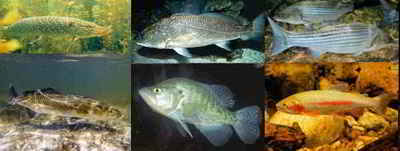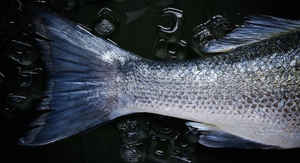
Florida Symbols
Florida State Saltwater Fish
Atlantic Sailfish

(Istiophorus platypterus)
Adopted in 1975.
Florida adopted the Atlantic Sailfish, (Istiophorus platypterus,) in 1975.
The Florida Department of Natural Resources reports that in the 25-year period ending in 1975, more than 14,000 sailfish were tagged and released. Sailfish-mania in Florida is evidenced by the increasing number of sailfish tournaments each year in this state.
Florida State Saltwater Fish: Atlantic Sailfish

The Atlantic
sailfish is a species of marine fish in the family Istiophoridae of the order Perciformes. It is found in the Atlantic Oceans and the Caribbean Sea,
except for large areas of the central North Atlantic and the central South Atlantic, from the surface to depths of 200 m (656 ft). The Atlantic sailfish
is related to the marlin.
Atlantic sailfish hunt schooling fish, such as sardines, anchovies and mackerel although they also feed on crustaceans and cephalopods.
Characteristics of the Atlantic Sailfish
The Atlantic sailfish is a metallic blue fish with
a large sail-like dorsal fin and a long and pointed bill-like snout. It is dark bluish-black on the upperparts and lighter on the sides (counter-shading),
with about twenty bluish horizontal bars along the flanks; the underparts are silvery white. The tail fin is strongly forked. The fins are bluish-black
and the front dorsal fin is speckled with small black spots. The bases of the anal fins are pale.
The length of this fish is up to 3.15 m (10.3 ft) and the maximum published weight is 58.1 kg (128.1 lb)
Average size and weight taken from Florida waters is 7' and 27 pounds. Author Ernest Hemingway landed a 9'1" sailfish in 1934 off Key West. Naturally, with its colorful and characteristic sail, the specimen frequently ends up on a den wall. The sailfish, (Istiophorus platypterus,) resembles a torpedo when swimming, and can reach speeds of 60 mph.
Habitat
Sailfish are not peculiar to Florida; they are found nearly everywhere there is warm ocean water. However, Florida sail fishing is legendary, especially in the Ft. Pierce, Miami and Keys areas during colder months. Sailfish migrate southward as the weather chills in the north.
A female sailfish releases several million eggs each year. Growth of the fish is rapid; a fertilized egg hatches within a day and a half, and by the end of the first year of life, a fish may have attained 6' in length. Experts believe the fish has a life span of up to ten years, but most are thought to live only 3 or 4 years.
Florida Law
The law designating the Atlantic sailfish as the the official Florida state saltwater fish is section 15.037 (Official state saltwater fish) of the 2008 Florida Statutes Title 4 (EXECUTIVE BRANCH) Chapter 15 (SECRETARY OF STATE) SECTION 15.037.
TITLE IV - EXECUTIVE BRANCH.
CHAPTER 15. SECRETARY OF STATE.
SECTION 15.037.
15.037 Official state saltwater fish.--The Atlantic sailfish (Istiophorus platypterus) is hereby designated and declared as the official Florida state
saltwater fish.
History.--s. 2, ch. 75-1.
Taxonomic Hierarchy: Atlantic Sailfish
Kingdom: Animalia - animals
Phylum: Chordata - chordates
Subphylum: Vertebrata - vertebrates
Class: Actinopterygii - ray-finned and spiny rayed fishes
Subclass: Neopterygii
Order: Perciformes, perch-like fishes
Family: Istiophoridae
Genus: Istiophorus
Species: Istiophorus platypterus







